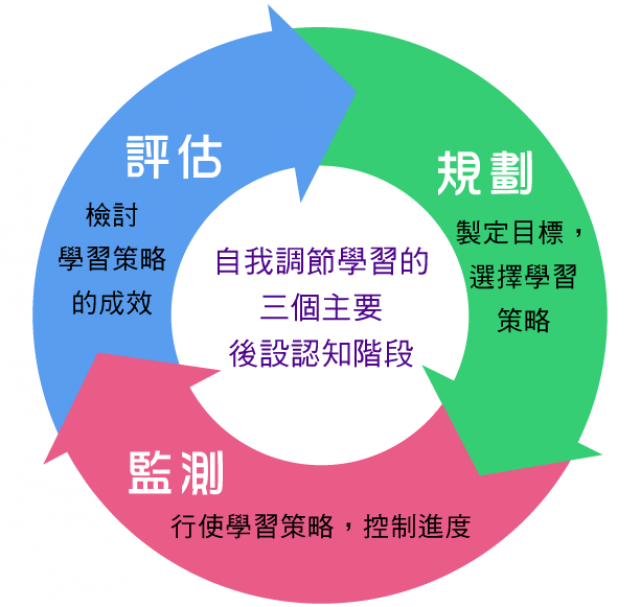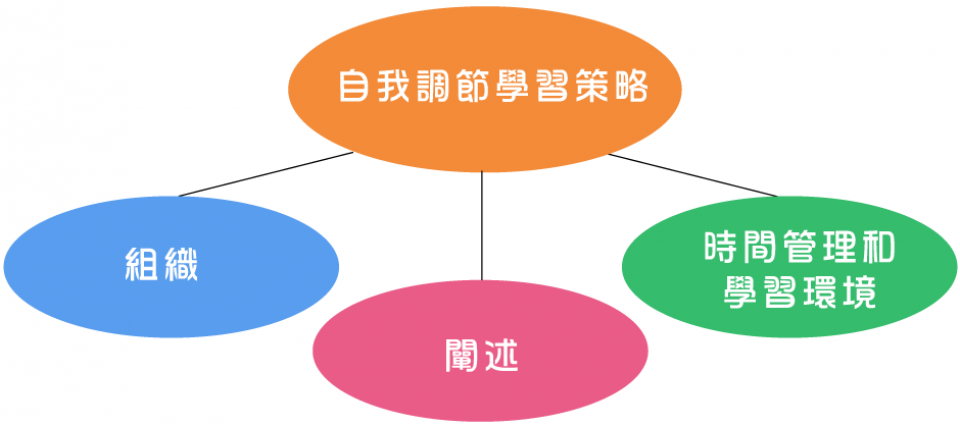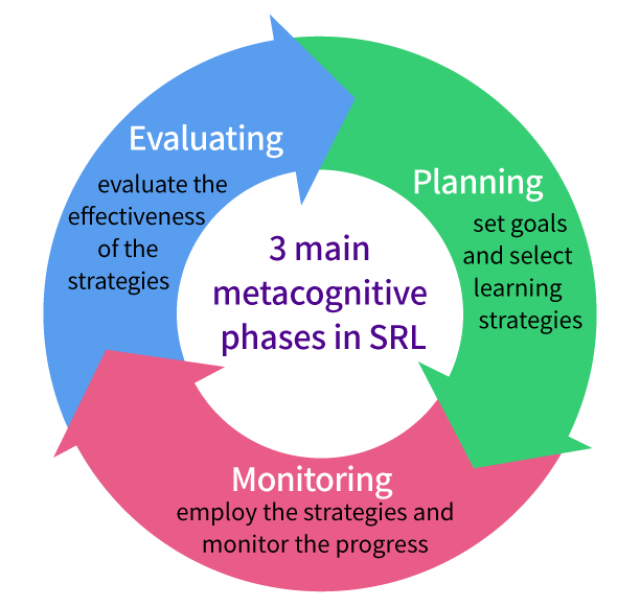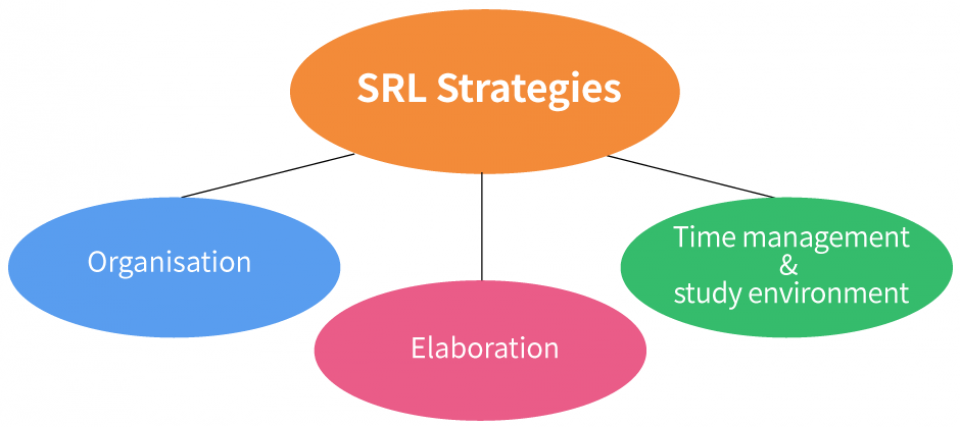自我調節學習 — 達致更高學習目標
什麼是自我調節學習?
自我調節學習是一個廣義術語,指針對某學習目標而自發產生的思維和行動(Zimmerman, 1989)。自我調節是有意識地管理思想、行為和情感的建構性過程,以獲取資訊和技能。學業成績稍遜與學業成績優異的學生差別在於後者傾向於使用更多更好的學習策略,如組織和時間管理。大部份學業成績優異的學生不僅聰慧、伶俐,而且更是良好的自我調節學習者。 許多學生認為他們不成功是基於能力不逮,但真正原因往往是從來沒有人教過他們如何有效地學習。培養自我調節學習策略可以改善學生的學習,對學生大有裨益。
自我調節學習中的三個後設認知階段
自我調節學習包括三個主要後設認知階段,即規劃、監測和評估(Zimmerman, 1998)。後設認知是泛指一個人認識及調整自己的認知學習歷程(Veenman, Van & Afflerbach, 2006)。它是管理學習所需的意識和知識。缺乏後設認知,學生難以有效地自律學習。研究人員提出,教師可以教導學生後設認知技巧從而改善他們的學習(Nietfeld & Shraw, 2002; Thiede, Anderson & Therriault, 2003)。為什麼後設認知對於自我調節學習這樣重要? 因為要有效地採用學習策略或提高學習技巧,人們必須意識到後設認知。
自我調節學習包括三個主要後設認知階段:第一個階段是規劃。 在規劃階段,學生製定目標,選擇學習策略以實現目標。學生可以利用以下的問題提醒自己,例如:「我應該學習什麼?」、「我可以使用哪些已有知識?」。 學生亦可估計一下實現目標所需要的時間和資源。下一個階段是監測。即學生努力觀察影響自己學習的行為、思考和行動。 在這個過程中,學生可以問自己:「我該怎麼辦?」、「如遇到困難,我應該調整步伐嗎?」。最後階段是評估,即學生檢討其學習策略的成效、作業表現和理解的程度(Wang, 2011)。 自我反思是學習中非常重要的策略。 如果學生反思他們的學習,他們會明白成敗的因由,以及如何改善自己的表現。 通過應用後設認知策略,具自我調節能力的學生會計劃、設定目標、組織、自我監測和自我評估其學習過程。學生愈發展後設認知能力和實踐上述三個循環階段,他/她的自我調節學習就愈有效。

(圖像由教學中心提供, 2017)
自我調節學習策略
教師如何教授學生自我調節學習策略? 教師可以在其日常教學中融入自我調節學習策略。自我調節學習策略包括以下幾項:組織是一種認知策略,即把相關資訊連結從而獲取其中意義。它包括概述、找重點、分類、排序和識別主旨。闡述是另一種認知策略,它是指詳盡深入地說明和陳述要表達的訊息。闡述的例子包括撮要、意譯、類比和概念圖。除了這些認知策略,時間管理和學習環境對於自我調節學習也是關鍵的。兩者創造了一種導向學習的環境。時間管理技能包括編排和規劃學習時間; 而學習環境則是確定一個合適的位置和可用的學習資源。兩者也被視為是學生該掌握的21世紀技能。此外,懂得尋求幫助和同儕學習也是促使學生更有效地發揮自我調節的方法。

(圖像由教學中心提供, 2017)
除了為學生締造積極的學習環境以引導和支持他們學習,教師會否考慮同時向學生推廣自我調節學習,幫助他們成為自己學習過程的主人,最終實現更高的學習目標?
延伸閱讀:
Center, T. E. A. L. (2010). Metacognitive processes. Washington, DC: American Institutes for Research. Retrieved May 8, 2017, from
https://lincs.ed.gov/sites/default/files/4_TEAL_Metacognitive.pdf
參考文獻:
- Nietfeld, J. L., & Schraw, G. (2002). The effect of knowledge and strategy training on monitoring accuracy. The Journal of Educational Research, 95(3), 131-142.
- Thiede, K. W., Anderson, M., & Therriault, D. (2003). Accuracy of metacognitive monitoring affects learning of texts. Journal of educational psychology, 95(1), 66.
- Wang, T. H. (2011). Developing Web-based assessment strategies for facilitating junior high school students to perform self-regulated learning in an e-Learning environment. Computers & Education, 57(2), 1801-1812.
- Veenman, M. V., Van Hout-Wolters, B. H., & Afflerbach, P. (2006). Metacognition and learning: Conceptual and methodological considerations. Metacognition and learning, 1(1), 3-14.
- Zimmerman, B. J. (1989). A social cognitive view of self-regulated academic learning. Journal of educational psychology, 81(3), 329-339. Retrieved May 8, 2017, from https://pdfs.semanticscholar.org/e1ff/53e710437e009f06bc264b093a2ba9523879.pdf
- Zimmerman, B. J. (1998). Developing self-fulfilling cycles of academic regulation: An analysis of exemplary instructional models. Retrieved May 8, 2017, from http://psycnet.apa.org/psycinfo/1998-07519-001
Self-regulated Learning for Achieving Higher Academic Goals
What is Self-regulated Learning (SRL)?
Self-regulated Learning (SRL) is a broad term that describes self-directed thoughts and behaviours that are used to achieve academic goals (Zimmerman, 1989). Self-regulation is a constructive process of managing thoughts, behaviours and emotion purposefully to acquire information and skills. The difference between academic survival and excellence is that the higher achieving students tend to use more and better learning strategies, such as organisation skills and time management. Most high achieving students are not just smart and highly intelligent, but they are good self-regulated learners. Many students believe that they are not successful due to ability, but in reality, they have never been taught how to learn effectively. The practice of SRL strategies can improve students' learning and the benefits of doing so are tremendous.
The Three Metacognitive Phases in SRL
SRL includes three main metacognitive phases, which are planning, monitoring and evaluating (Zimmerman, 1998). Metacognition was originally referred to as knowledge and regulation of one's cognitive activities in learning processes (Veenman, Van & Afflerbach, 2006). It is the awareness and knowledge required to regulate one's learning. Without metacognition, students could hardly effectively regulate their learning. Researchers suggested that metacognitive skills can be taught to students to improve their learning (Nietfeld & Shraw, 2002; Thiede, Anderson & Therriault, 2003). Why is metacognition important for SRL? In order to adopt learning strategies or improve learning skills, one has to be aware of it.
Regarding the three main metacognitive phases in SRL, the first phase is planning. During the planning phase, students set goals and select learning strategies to reach goals. There are some useful questions for students to prompt themselves, such as “What am I supposed to learn?” “What prior knowledge can I use?” Students can also estimate how much time and resources will be needed to reach their goals. The next phase is the monitoring phase. It involves students' effort to observe their own behaviours, thoughts and actions that impact learning. In this process, students can ask themselves, “How am I doing?”, “Should I adjust the pace where there are difficulties?” The final phase is evaluating, of which students assess the effectiveness of the strategies, the task performance and the comprehension level (Wang, 2011).
Self-reflection is a very important strategy in learning. If students reflect on their learning, they would understand what contributes to their success and failure, and how they could improve their performance. By applying the metacognitive strategies, self-regulated students plan, set goals, organise, self-monitor and self-evaluate their learning process. The more a student develops and practises the above cyclical metacognitive process, the more effective his/her self-regulated learning would be.

(Image courtesy of CLT, 2017)
SRL Strategies
How can teachers teach students SRL strategies? Teachers can embed SRL strategies in their daily teaching. SRL strategies include the following strategies: Organisation strategy is a cognitive strategy you can use to connect information among information for meaning making. It includes outlining, highlighting, grouping, sorting and main ideas identification. Elaboration is another cognitive strategy which refers to assigning meaningful information to something you are trying to present and remember. Elaboration examples include summarising, paraphrasing, analogies and concept maps. Apart from these cognitive strategies, time management and study environment are also crucial to one's SRL. They create an environment that is conductive to learning. Time management skills include scheduling and planning study time; while study environment is about determining a suitable location and ensuring available resources for learning. They are also considered as 21st century skills that students should be able to master. Moreover, help seeking and peer learning are SRL strategies that make a student become more self-regulatory in learning.

(Image courtesy of CLT, 2017)
On top of creating positive learning environment to engage and support students' learning, would teachers also consider promoting SRL to students which help them become masters of their own learning process, and ultimately achieve higher academic goals?
Extended Reading:
Center, T. E. A. L. (2010). Metacognitive processes. Washington, DC: American Institutes for Research. Retrieved May 8, 2017, from
https://lincs.ed.gov/sites/default/files/4_TEAL_Metacognitive.pdf
References:
- Nietfeld, J. L., & Schraw, G. (2002). The effect of knowledge and strategy training on monitoring accuracy. The Journal of Educational Research, 95(3), 131-142.
- Thiede, K. W., Anderson, M., & Therriault, D. (2003). Accuracy of metacognitive monitoring affects learning of texts. Journal of educational psychology, 95(1), 66.
- Wang, T. H. (2011). Developing Web-based assessment strategies for facilitating junior high school students to perform self-regulated learning in an e-Learning environment. Computers & Education, 57(2), 1801-1812.
- Veenman, M. V., Van Hout-Wolters, B. H., & Afflerbach, P. (2006). Metacognition and learning: Conceptual and methodological considerations. Metacognition and learning, 1(1), 3-14.
- Zimmerman, B. J. (1989). A social cognitive view of self-regulated academic learning. Journal of Educational Psychology, 81(3), 329-339. Retrieved May 8, 2017, from https://pdfs.semanticscholar.org/e1ff/53e710437e009f06bc264b093a2ba9523879.pdf
- Zimmerman, B. J. (1998). Developing self-fulfilling cycles of academic regulation: An analysis of exemplary instructional models. Retrieved May 8, 2017, from http://psycnet.apa.org/psycinfo/1998-07519-001
